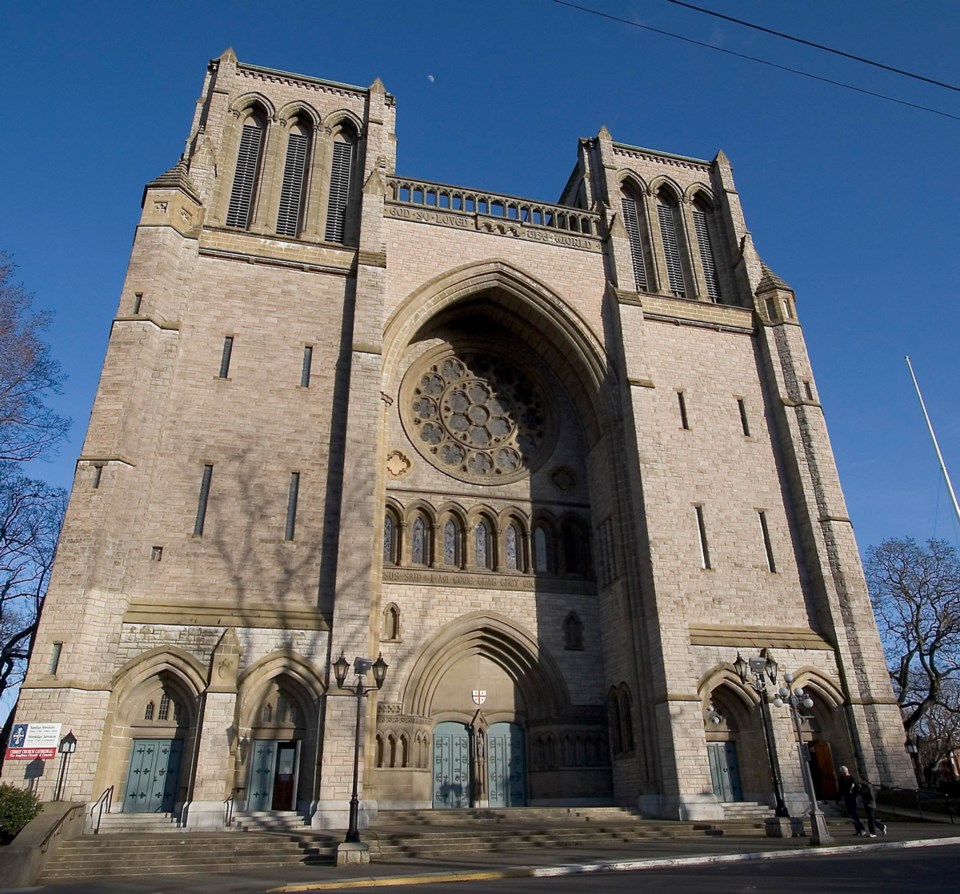This summer, Michael Gormley retired as organist and director of music at Christ Church Cathedral, a position he had held since 1984. He has been replaced by Donald Hunt, a Canadian organist and church musician who has spent most of the past decade based in the U.K.
Hunt arrived in Victoria on July 15, officially took up his new position two days later, and was soon playing in the cathedral’s services. Before being interviewed for the position, in late January, he had visited Victoria only once before, years ago, as a tourist. Now he presides over one of the city’s most important musical institutions.
Hunt, 32, was born and raised in Halifax, and earned bachelor’s and master’s degrees at McGill University, in Montreal, where he studied organ performance as well as conducting and composition. He is an associate of the Royal Canadian College of Organists.
Hunt had church jobs in Halifax and Montreal, then, after leaving McGill in 2009, held short-term positions in the U.K., first at Truro Cathedral, then at St. Paul’s Cathedral in London, then in Newark-on-Trent. He also became a fellow of the Royal College of Organists. From 2012 through this year, he simultaneously held positions at Fettes College and at St. Mary’s Episcopal Cathedral, both in Edinburgh, Scotland.
Among Hunt’s many organ recitals are recent appearances at St. Paul’s, at the Edinburgh Festival Fringe, and in Stockholm. He has appeared on BBC radio, including during Scottish celebrations of the Queen’s Diamond Jubilee, in 2012.
Hunt praises Christ Church’s Hellmuth Wolff organ as “really characterful,” its individual stops as well as combinations thereof, and he praises its versatility, too, and its aptness not only for its native North German music but for much other repertoire — French Baroque, French symphonic, contemporary.
He will make his first high-profile appearance here on All Saints Sunday, Oct. 29, which is also Reformation Sunday. It is made more significant this year in that Reformation Day (Oct. 31) marks the 500th anniversary of the day Martin Luther, according to tradition, nailed his Ninety-five Theses to a church door in Wittenberg, Germany, sparking the Protestant Reformation.
On Oct. 29, Hunt will participate in a Lutheran Eucharist service (10:30 a.m.); will perform organ music based on Lutheran chorale melodies, in a concert that will also include chorale motets performed by the St. Christopher Singers (2 p.m.); and will join in a special Choral Evensong honouring the English Reformation (4:30 p.m.).
The following Sunday, Nov. 5, as a celebration of All Souls Day, Hunt will make his local debut as a conductor, leading the cathedral’s choirs and the Victoria Children’s Choir in a liturgical performance of Fauré’s Requiem (4:30 p.m.).
On Dec. 3, Hunt will help mark the beginning of the Christmas season by performing in the Advent Procession (4:30 p.m.), which he describes as “my favourite service,” a celebration of darkness yielding to light and “certainly the most dramatic service of the year.”
He plans to make his local solo debut with a daytime recital on New Year’s Eve, devoted to Messiaen’s early, visionary La Nativité du Seigneur (1935), an hour-long sequence of nine “meditations” that focuses on characters and doctrines related to the Christmas story, in music that is at once pictorial and spiritual.
This, Hunt says, “is a piece that should be listened to every year — a wonderful meditation.” Performing the Messiaen annually is something he has done elsewhere and would like to make a tradition here, “almost like a pilgrimage every year.”
Hunt’s most ambitious plan draws on his considerable experience training young treble voices: the creation of a new music program on the English model, allied with Christ Church’s Cathedral School. Twenty to 30 children would receive, for four or five years, in addition to their regular schooling, training in vocal technique, musicianship and music theory, and would be exposed to the best choral repertoire through sightreading and rehearsals at the start of each weekday.
Such a program did exist here, many years ago, but now would be unique in Canada.
A formal announcement of the program is expected by the end of September.
